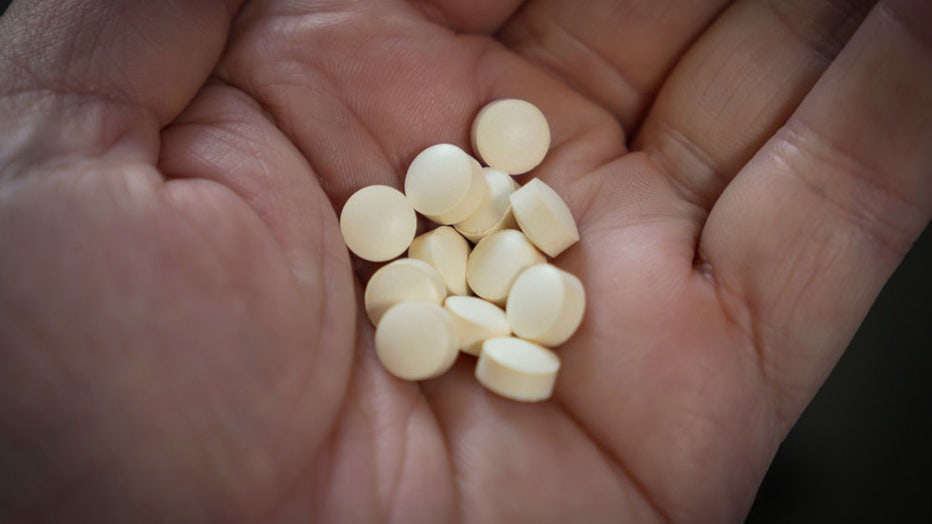Kyiv’s city council to give out potassium iodide pills in case of Russian nuclear attack
The city council of Kyiv, Ukraine’s capital and largest city, announced it will set up evacuation centers as well as provide potassium iodide pills to prepare for a possible nuclear attack by Russia.
Since Russian forces invaded Ukraine in February, the war-torn country has continued to fight back, reclaiming areas once taken by Russian troops and further working to push out the offensive.
Ukrainian forces recently scored significant gains in the south, raising flags over the villages of Arkhanhelske, Myroliubivka, Khreshchenivka, Mykhalivka and Novovorontsovka.
Speaking late Tuesday in his nightly video address, Ukrainian President Volodymyr Zelenskyy said dozens of settlements had been retaken "from the Russian pseudo-referendum this week alone" in the four annexed regions. In the Kherson region, he listed eight villages that Ukrainian forces reclaimed, "and this is far from a complete list. Our soldiers do not stop."
However, Russian troops continue their deadly missile strikes on large cities, cutting off power and severely damaging Ukraine’s infrastructure.
While it was not explicitly detailed that nuclear weapons would be used in the war, Russian President Vladimir Putin has said that he would "use all the means at our disposal" to win the war while his ground forces retreat from a Ukrainian counterattack.
For now, analysts cautiously suggest that the risk of Putin using the world's biggest nuclear arsenal still seems low. The U.S. Central Intelligence Agency said it hasn't seen signs of an imminent Russian nuclear attack.
Still, Putin’s vows to use "all the means at our disposal" to defend Russia as he wages war in Ukraine are being taken very seriously. And his claim last Friday that the United States "created a precedent" by dropping atomic bombs in World War II further cranked up the nuclear stakes.
Kyiv’s city council said potassium iodide pills will be distributed to residents in areas contaminated by nuclear radiation if there is a need to evacuate.
How do potassium iodide pills work?

FILE - Potassium iodine pills are seen in this photo illustration. (STR/NurPhoto via Getty Images)
Potassium iodide pills can help block the absorption of harmful radiation by the thyroid gland if taken just before or immediately after exposure to nuclear radiation.
The pills work by blocking radioactive iodide from entering the thyroid. When a person takes potassium iodide, "the stable iodide in the medicine gets absorbed by the thyroid. There is so much stable iodide in the potassium iodide that the thyroid gland becomes ‘full’ and cannot absorb any more iodide—either stable or radioactive—for the next 24 hours," according to the U.S. Centers for Disease Control and Prevention.
It is important to note that while potassium iodide pills can protect your thyroid gland from absorbing harmful radiation, that’s all it will do. Body parts as well as other organs will not be protected from exposure to radiation, the CDC said.
When and who should you take potassium iodide?
Like with most things, too much of anything is never a good idea. The CDC recommends only taking one dose of potassium iodide in a 24-hour time frame.
Taking more than the recommended dose can actually lead to severe illness or even death.
The U.S. Food and Drug Administration also outlined different doses depending on age.
Infants, children and adolescents should be given lower dosages, as well as pregnant women while adults 18 and older should take the full recommended dosage.
The people who should avoid taking potassium iodide are anyone who may have an allergy to iodide and if they suffer from certain skin disorders such as dermatitis herpetiformis or urticaria vasculitis, the CDC said.
But, as with anything, people who are considering taking potassium iodide pills should first consult with a physician.
Side effects of potassium iodide
Usually, taking potassium iodide in the correct dosage and time frame yields few negative results, according to the CDC, however, here are some side effects that have been reported as a result of taking it:
- Skin rashes
- Swelling of the salivary glands
- "Iodism" (metallic taste, burning mouth and throat, sore teeth and gums, symptoms of a head cold, and sometimes upset stomach and diarrhea)
- An allergic reaction can have more serious symptoms. These include fever and joint pains; swelling of parts of the body (face, lips, tongue, throat, hands, or feet); trouble breathing, speaking, or swallowing; wheezing or shortness of breath. Severe shortness of breath requires immediate medical attention.
The Associated Press contributed to this report. This was reported from Los Angeles.

